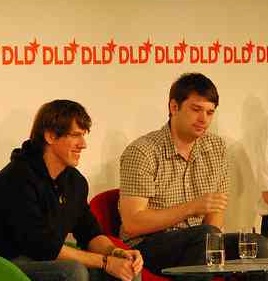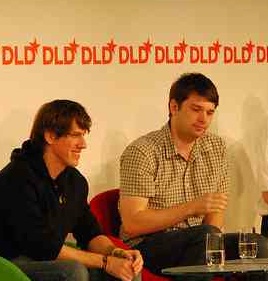
These are my notes from a panel on ‘Local Markets’ at the DLD Conference in Germany, which featured Groupon CEO Andrew Mason and Foursquare CEO Dennis Crowley.
Q: Two very exciting startups on stage. Dennis and Andrew, what year did you start?
Dennis: March 2009.
Andrew: November 2008.
Q: In my mind, the concept of local is core to both your companies – social as well, but local primarily. Can you talk about that?
Dennis: What we think about when we build products at Foursquare: how do we build things that make cities easier to use? Our software introduces people to other people, lets you discover new places, experience new things. There are the game dymanics to encourage people to go out and do new stuff, and then we started seeing local merchants getting involved.
Andrew: Groupon started as ThePoint.com, a platform where groups of people trying to solve the same problem could gather and coordinate online. We weren’t really getting anywhere, and doing local daily deals came next.
Q: Can you give some examples to what kind of initiatives came in at ThePoint?
Andrew: Early things included stuff like: we want to ‘build a local park’, ‘make election day a national holiday’, and ‘let’s get 80 people together to get a group discount’. So we saw the group buying efforts happening on our platform and took notice.
We’re basically helping consumers discover interesting businesses. But unlike Foursquare, I have to say it’s about the money for a large part, getting that discount, so we’re much less innovative than them.
Q: It’s always been quite hard for local merchants to be found. How do you look at the differences between your companies in trying to solve that problem?
Dennis: We’re more about loyalty, aiding businesses who want to reward regular customers, while Groupon I think is more about new customer acquisition. Foursquare is also users leaving tips for other users, which makes it more of a discovery thing.
Q: Is Foursquare a social company?
Dennis: I’d say social plus location. A lot of people think it is about present tense, but the great thing is that, over time, you get a great, rich profile of users, what type of person they are.
Q: While Groupon is more a simple discount service?
Andrew: We’re not a discounting service, and I don’t know what ‘social commerce even means’. Local ecommerce sounds more relevant to what we do. We’re going to continue to go down that path, bringing offline commerce online, to create a more efficient market for local businesses.
Q: Why do you think both your companies saw such a quick uptake?
Andrew: We cracked that local ecommerce nut, and it’s a serious nut. There wasn’t even a good form of customer acuiqsition before the Internet, for local businesses. I mean, advertising on radio and in local newspapers was about spending money upfront, to buy exposure, and then cross your fingers.
You don’t have a lot of margin to screw up and try again. With Groupon, local businesses can pay for what matters, acquiring new customers.
Q: Okay, but why hasn’t that happened in the past?
Andrew: It wasn’t intuitive to us either, so I don’t really know. We looked at group buying as a concept from a consumer standpoint, but we didn’t fully realize how vital something like this could be to small busienssess in a city. Maybe it could have existed ten years ago, but it wouldn’t have grown this quickly.
Q: You’ve both enjoyed quick growth, gotten lots of attention. What is that like? Before it took some time to build your startup and get exposure, right now it’s happening more quickly.
Dennis: We’re 50 people now, so to me that’s big, if you look at the fact Dodgeball was basically two of us. But we talk to merchants and notice that we could use more people already. There’s so much exposure, and that’s great, but then we need to keep focused and realize that the road is still long.
Q: What’s the biggest misconception about Foursquare?
Dennis: The company’s size is the first. Second is that some people seem to think Foursquare is for hipsters in New York and San Francisco. That’s certainly how we got started, but we have a lot of international usage, all over the world. It’s a big surprise for us.
Q: What are the biggest challenges when growing as fast as Groupon did?
Andrew: Our growth may have been quick, but it was incremental. We started in Chicago, and it took us 5 months before our second city, and then the time shortened each time we launched in a new city. So we took our time to develop the original playbook, and we try to copy that strategy with our international expansion.
By creating a strong cultural foundation, and hiring great people and entrepreneurs. So we provide the playbook, they execute.
Q: What’s the culture like at foursquare?
Dennis: We have lots of fun, and when we recruit, we try to bring in people who are not only good engineers, but also know how social works, are passionate about it. We hired a lot of our friends in the early days, and that translates very well into the culture.
But we need to stay humble, despite all the press coverage. That gets harder the more exposure you get, by the way. We’re at 6 million users, but we still have a long way to go.
Q: Andrew, there’s a distinct culture at Groupon. Where does that come from?
Andrew: Groupon as a business model has a surprising element, which part of the fun, getting a new deal every day. That has given us permission to extend that craziness into other aspects of the business, such as the copywriting.
What I worry about is keeping people from getting overexcited because of all the buzz that we get. We have to rememver we’re only two years old, and the road is still very long.
There’s not time for celebration yet. Even in all hands meeting, we spend a lot of time talking about everything that could go wrong.
Q: Do you beat people with sticks?
Andrew: Not anymore.
Q: What’s your biggest worry as an entrepreneur?
Andrew: What I care about is not becoming complacent, not being satisfied with what we are today, continuing to innovate. Often, companies that rise quickly, and fail quickly, lose to themselves and not a competitor.
We’re still growing, and things are moving along nicely, so I think if we focus on making customers happy, we’ll continue to find new ways to disrupt ourselves.
Q: Both of you have turned down offers from larger companies to acquire you. What can you say about that?
Dennis: Of course, I had my experience with Dodgeball, so I’m in a good position to keep taking the ideas in my head and build products, and getting them to people. I always say this, but we’re not at 10% to 20% of the roadmap, so it’s far too early to get off the ride.
We want to keep pushing. The toughest part is having confidence in our team to do that. It’s a bit of a gamble sometimes, especially when you’re smaller. Getting from 5 to 50 employees was certainly not easy.
Q: You’ve publicly said that you carry some regrets about your first acquisition. Did that strengthen you in turning down the purchase offers for Foursquare?
Dennis: Well yes, and we also have very supportive investors, they want us to shoot for the moon. There wasn’t much pressure. Someone once told me that when you turn down a deal like that, you think about it every day afterwards, which is probably true but something I’m cool with.
Q: Andrew, Google wanted to acquire Groupon. Can you talk about that?
Andrew: Can you give me some options on how to dodge your questions?
Q: What the hell were you thinking?
Andrew: I can’t comment on any speculation, but I can say that local ecommerce is an exciting space to be in. Awesome alternative answer, isn’t it?
Q: Yes, you said absolutely nothing there. How do you balance what’s right for your team, your investors, how do you make that call?
Andrew: We’re very lucky to have great cofounders and investors, and we talk about all kinds of decisions thoroughly. I’ll stop here … it’s not going to be a good answer.
Q: What’s next? Are you talking to bankers about going public?
Andrew: Yes, we are. We’re learning, because we don’t know what to do. That’s the honest truth. We haven’t made a decision yet.
Q: What’s it like, talking to bankers?
Andrew: It’s like talking to investors. Pretty much the same.
Q: Is an IPO the right thing for you to do?
Andrew: It seems like a reasonable thing to do. And IPOs are juicy for the business community, but I see it as just another step in the direction we’re going. I’m thinking long term.
Q: Dennis, where is Foursquare going?
Dennis: Funnily enough, lots of people look at Foursquare and sees a check-in game. We started off like that, but we would like to prove that we’re now more than that. We’re getting interesting data from users, and we’re thinking of ways to recycle it back to these users in ways that can make their lives richer and more interesting.
Q: What about the third party apps that are using Foursquare as a foundational platform?
Dennis: Outside the products we build, we have this platform that developers can use to create stuff on top of our infrastructure. We see a lot of different things being built by thousands of developers, from review services to dating services.
Andrew: Can I interrupt? I want to say why I wasn’t keen on answering your earlier questions. I don’t want to be corporate douchebag, it’s what I wanted to avoid. But let me explain why I dodge these questions.
First time we acquired a company, we didn’t know what to expect. It’s a very personal process, you’re getting to know each other, it’s very intimate, and then suddenly everyone wants us to do that in the open while we’re still figuring things out.
Q: So you do it out of respect? No kiss and tell?
Andrew: (sighs) Yeah.
Q: What would you like Groupon to become?
Andrew: We want to be the Amazon or eBay for local ecommerce. We want to be what people think about when that business comes up in conversations. There’s a big opportunity for a company to bring offline commerce online, and we’re well positioned to do that.
Photo credit: FLickr/ Florian Krakau































Comment